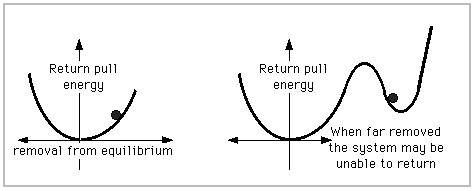 |
On the book, The End of Certainty, (1997) N.Y. Free Press by Ilya Prigogine
Scientists believe they understand the laws governing the behavior of
atoms. The world and everybody in it is made up of atoms. So, one ought
to be able to explain, predict, and retrodict everything in the world
that is happening, will be happening, or has happened. But even the most
arrogant of scientists is humbled by the prospect of undertaking to do
it. Why? Well, nobody knows how to go about it; mainly because we have
so little understanding of irreversible processes, such as
self-organization, for example. For decades Professor Prigogine has
almost singlehandedly wrestled with understanding non-equilibrium
processes. In this book, his most recent, he claims to show a path
toward recasting some of the fundamental laws of physics to account for
the world as we actually know it.
I propose this be followed by a reading of the essay by David Burch on
Spirituality.
Present were Jeff, Meredyth, Don, Glenn, Roberto, Roger, Jackie (first time) and Marvin.
Don began with his report on the book, "The End Of Certainty. Time, Chaos and The New Laws of Nature", 1997, Free Press, London. It is by Ilya Prigogine. (Referring to inheritance in figs the name, Prigogine, scans like fig-o-gene)
He was an octogenarian when he wrote the book. A brilliant and energetic man all his life he won the 1977 Nobel Prize in Chemistry for his work on "Non-Equilibrium Statistical Mechanics and Dissipative Structures". He has devoted himself to understanding the behavior of systems far removed from equilibrium.
Don read several passages from introductory sections of the book so as to give us the flavor of the work in the author's words. Prigogine is apparently given to grandiose assertions. See the review by Per Bak at
http://www.science-books.com/sciencebooks/reviews/endofcertainty.html
What emerged from Don's discussion was this:
1. The natural trend of physical systems is towards disorder.
This principle is embedded in physics as the Second Law of Thermodynamics.
On the occasion that something happens - anything at all, a sound emitted, a stone falls - there is a change in entropy. Entropy measures disorder.
The Law says that the entropy of the universe can never decrease when anything at all happens in nature. Generally it increases. Disorder increases.
A profound statement. And a sacred one because, if the Law were not true, a mighty structure of confirmation would not be standing. A myriad of experimentally verified deductions depend on this law - of ever increasing disorder. It is so firmly rooted that Tables of Entropy exist for various substances. This law makes entropy a measurable.
2. But in spite of this Law, just as natural, in ordinary experience, is that order arises spontaneously in the universe.
Cooperative phenomena exist. Like microbes, plants, animals, households.
These ordered phenomena arise amidst the trend toward disorder. They are all examples of self-organization.
The emergence of self-organization doesn't contradict the increasing entropy law. For self-organization to proceed two things are necessary: a source of energy must be available and waste must be produced.
The waste products from self-organization are cast off into the universe. It is the waste that accounts for the entropy increase of the universe. The self-organization itself represents a decrease in entropy - less disorder. But the waste generated in the process represents an increase in entropy - more disorder. And this increase always exceeds the decrease. The manufacture of disorder exceeds the self-organization order.
 |
 |
| n. 1. a person who is not a Christian, Moslem, or Jew;
heathen: formerly, sometimes applied specif. to a non-
Christian by Christians. 2. a person who has no religion. adj. 1. of pagans or paganism; not Christian, Moslem, or Jewish 2. not religious; heathen. |
| 1pagan \ [ME, fr. LL paganus, fr. L, civilian, country dweller, fr.
paganus, adj., of the country, fr. pagus, country, village, district;
akin to L pangere to fix, fasten, [pascisi to agree, contract -- more at
pact] 1: heathen 1; esp : a follower of a polytheistic religion (as in
ancient Rome) 2: One that has little or no religion and that is marked
by a frank delight in and and uninhibited seeking after sensual
pleasures and material goods : an unrestrained irreligious hedonist and
materialist (is a ~ of the decadence ... takes the world with an
exquisite nonchalance and prefers a well-ordered dinner to a
dissertation on the immortality of the soul -- T. L. Peacock) 2pagan \"\ adj : of, relating to, or having the characteristics of pagans : HEATHENISH (~ customs) (represents the earthy, ~ acceptance of life in all its sensual vulgarity -- R. M. Kain) (the ~ concept of death and oblivion as the natural end of life -- Cyril Connolly) |
November 1997
Marvin Chester
email: chester@physics.ucla.edu
© m chester 1997 Occidental CA